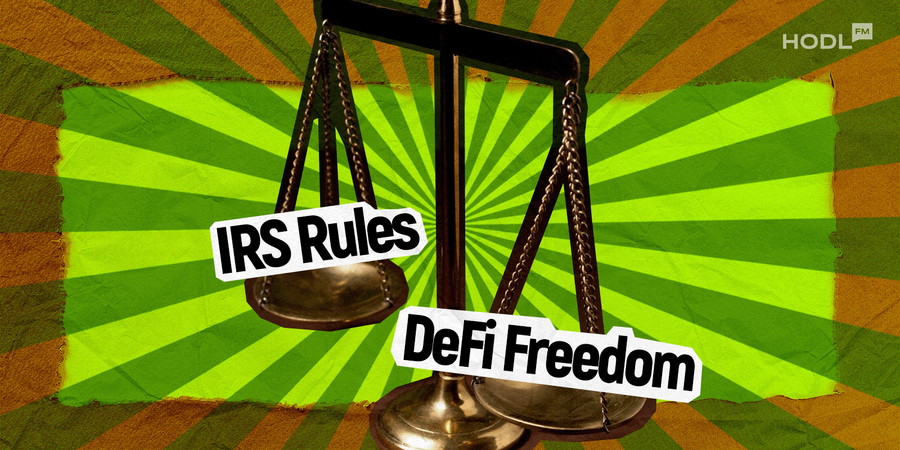The crypto industry in the U.S. is again under fire from regulators, and this time, the DeFi sector is in the crosshairs. Regulators aim to classify DeFi platforms as brokers, requiring them to disclose confidential user information for transactions.
Updated regulations are set to take effect for digital asset sales beginning in 2027. Brokers must begin collecting and reporting the required transaction data by 2026. These regulations are expected to impact between 650 and 875 DeFi brokers and up to 2.6 million U.S. taxpayers.
New rules have already been heavily criticized in the community, with lawsuits against the IRS already generating positive momentum among crypto enthusiasts.
— Brian Armstrong (@brian_armstrong) December 30, 2024
What IRS Rules Mean for the Industry
The IRS has released new rules requiring brokers to report digital asset transactions. Expanding existing reporting requirements to include interface platforms, the finalized regulation now classifies DeFi interfaces as brokers.
The document doesn’t apply broadly to all DeFi applications or their level of decentralization. Instead, it defines brokers as platforms facilitating transactions, including groups of individuals involved in transaction facilitation, regardless of whether they operate through a legal entity.
Reporting requirements target interface platforms that enable transactions involving digital assets for clients, essentially decentralized exchanges.
In simple terms, if a DeFi platform facilitates the exchange or sale of digital assets, even through smart contracts, and exerts sufficient control or influence over the transaction process, it could fall under the broker definition.
The final ruling states:
The Treasury Department and the IRS have determined that in these final regulations, the only DeFi participants that should be treated as brokers are trading front-end service providers.
In response, the Blockchain Association and the Texas Blockchain Council have filed a lawsuit against the IRS.
Today, @BlockchainAssn, @fund_defi, and @TXblockchain_ filed a lawsuit challenging the IRS’ broker rulemaking.
— Blockchain Association (@BlockchainAssn) December 28, 2024
This rule – as the countless comment letters warned – risks crippling the U.S. digital asset sector.https://t.co/D8VsDpNJvW pic.twitter.com/8HDvpIhBHC
Kristin Smith, CEO of the Blockchain Association, stated on X that the lawsuit argues the IRS rules violate the Administrative Procedure Act and infringe on constitutional rights.
The IRS maintains that the rules simply treat DeFi like any other industry, citing that broker regulations have existed for over 40 years:
"The Treasury Department and the IRS disagree with the notion that these final rules reflect bias against the DeFi industry or that they will hinder lawful adoption of this technology by compliant customers."
The Fight Against Regulations
The new IRS rules have naturally raised concerns among blockchain developers and proponents of DeFi.
Katherine Minarik, Chief Legal Officer of Uniswap, questioned the legitimacy of the IRS’s decision, arguing that the ruling misclassifies DeFi platforms as brokers and must be challenged.
Yep, @CampbellJAustin beat me to it. Reading fast here, but it sure does seem like the IRS says they’re regulating “any service effectuating transactions” as brokers… then goes on to classify DeFi tech as brokers… because it is involved in just a *part* of a transaction… as… https://t.co/H6zBG5sIK8 pic.twitter.com/j4dYzhuZJO
— Katherine Minarik (@MinarikLaw) December 27, 2024
Uniswap CEO Hayden Adams echoed these concerns, expressing hope that the ruling will be overturned either through the Congressional Review Act (CRA) or legal challenges.
Some legal experts argue that the new IRS regulations violate DeFi users' rights to privacy. Marisa Coppel, Head of Legal at the Blockchain Association, described the regulations as an invasion of privacy that could push this burgeoning technology out of the country.
7/ This rule violates the APA, the constitution, and the IRS’s statutory authority. By exposing wallet addresses, it also violates the privacy rights of millions of Americans who wish to transact outside the traditional financial system.
— Marisa Tashman Coppel (@MTCoppel) December 28, 2024
Meanwhile, other industry analysts are exploring potential paths for DeFi platforms should the rules remain in place. Alex Thorn, Galaxy Digital's Head of Research, proposed that platforms could choose to meet broker requirements, restrict access for U.S. users, or function as decentralized applications with limited user engagement and no transaction fees to sidestep broker classification.
The outcome of the lawsuit will determine whether DeFi remains a driver of innovation in the U.S. or is forced to find refuge in more accommodating jurisdictions.

Disclaimer: All materials on this site are for informational purposes only. None of the material should be interpreted as investment advice. Please note that despite the nature of much of the material created and hosted on this website, HODL FM is not a financial reference resource and the opinions of authors and other contributors are their own and should not be taken as financial advice. If you require advice of this sort, HODL FM strongly recommends contacting a qualified industry professional.





